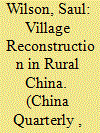| Srl | Item |
| 1 |
ID:
130165


|
|
|
|
|
| Publication |
2014.
|
| Summary/Abstract |
Gandhi was a strong critique of modernity. In his scheme of economy, production and technology there is room for machine but that would not replace human labour and concentration of power in the hands of few. He gave primary importance to simple technology over heavy industries. Simple technology can create mass employment, whereas advanced technology can lead to vast unemployment in a country like India. Thus, he preferred production by masses over mass production by heavy machinery. He wanted that appropriate technology and ideology should go together with culture of self-control. He believed in eco-humanism and integral development of men and a decentralized socio-economic, political order at the grassroots under people's direct control. He strived for an alternative practice, which was trusteeship and that was distinctly local or relevant to specific contexts. Trusteeship alone could bring about the regeneration of India society.
|
|
|
|
|
|
|
|
|
|
|
|
|
|
|
|
| 2 |
ID:
131450


|
|
|
|
|
| Publication |
2013.
|
| Summary/Abstract |
In 1946, American architect Albert Mayer began a pilot project in "village reconstruction" for India. The resulting Etawah project in the northern Indian state of Uttar Pradesh helped inspire a national program in India and appeared as a model to U.S. policy makers, international organizations, and postcolonial leaders seeking to align peasants to elite development goals. Although it would be swept up in Cold War ambitions and in Cold War historiography, Etawah was not just a Cold War project or even simply an American or Indian project. Over time, Indians colluded with Americans in the erasure of Etawah's transnational roots and rewrote the pilot project for a range of, often contradictory, purposes. Unpacking the many versions of Etawah reveals that the origins of development as a field are to be found in transnational interchanges, contending national, imperial, and disciplinary visions, and conscious efforts to shape its meaning.
|
|
|
|
|
|
|
|
|
|
|
|
|
|
|
|
| 3 |
ID:
166875


|
|
|
|
|
| Summary/Abstract |
Using examples from village reconstruction programmes in rural China, we show that local cadres often prioritize project visibility over publicized policy goals. While central policies and the academic literature emphasized land reclamation or rural welfare, local cadres – and the projects they designed – tended instead to focus on projecting an image of urban, wealthy villagers. Where such image-driven behaviour is most deleterious to villagers, it can evince opposition. We observe that some areas avoid conflict by making these projects voluntary or adjusting projects to local conditions. However, we provide a case study of a village with strong village leadership, showing that contrary to recent claims that village cadres are increasingly impotent, some maintain the authority to override widespread objections from villagers.
|
|
|
|
|
|
|
|
|
|
|
|
|
|
|
|